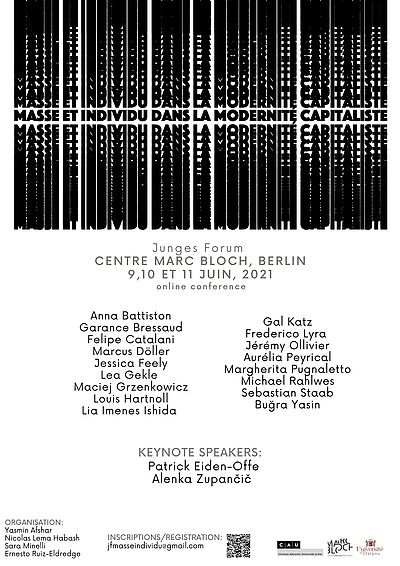JUNGES FORUM: Mass and Individual in Capitalist Modernity,
June 09 | 14:00
Responsables/Veranstalter*innen
Yasmin Afshar (Humboldt-Universität zu Berlin /Centre Marc Bloch)
Nicolas Lema (Université Paris 1 Panthéon-Sorbonne)
Sara Minelli (Christian-Albrechts-Universität zu Kiel/Centre Marc Bloch)
Ernesto Ruiz-Eldredge (Goethe-Universität Frankfurt/Université de Poitiers)
Comité scientifique/Wissenschaftliches Komitee
* Paula Diehl (Christian-Albrechts-Universität zu Kiel)
* Irina Feldman (Middlebury College)
* Katia Genel (Université Paris 1 Panthéon-Sorbonne/Centre Marc Bloch)
* Christoph Menke (Goethe-Universität Frankfurt)
Junges Forum: Mass and Individual in Capitalist Modernity,
9th, 10th and 11th June, Centre Marc Bloch
Registration: https://forms.gle/QhW6CcCM2Nmfegfe8
The notion of the “mass” is back on the agenda. Recent large-scale popular protests, the extraordinary importance acquired by social networks, the current appeal of conspiracy theories, as well as so-called “populist” phenomena, have triggered a renewed discussion around this concept. Since its emergence at the beginning of capitalist modernity, the idea of the 'mass' has implied a certain reactionary conception of collective action, according to which the individual's judgment capacity is eclipsed by irrational behavior. The First World War and the rise of fascism apparently brought to reality this representation: the individual, weakened by social atomization, succumbed to a tyrannized mass. In contrast, during the last two hundred years, the participation of the individual in collective bodies—be it the “mass,” “multitude” or “people”—has inspired revolutionary hopes for emancipation. It is therefore relevant to ask: is it possible to speak of the "mass" without falling into either an unqualified condemnation of collective action or a pure exaltation of the multitude? From factory workers to "petty bourgeois” masses, do we find specific organizational regimes in the constitution of their political subjectivity? What are the material and intellectual means whereby artworks represent and transform the links between the mass and the individual? Have the social sciences successfully theorized the mass? Is the moral and psychic autonomy of individuals affected by the capitalist organization of society? What can be said about the recurrent phenomenon of the mass adhering to conspiracy theories? In this sense, are the masses simply prey of ideological domination? Or, on the contrary, do they exhibit a will-to-know, unnoticed by the “elites”?
This Junges Forum will bring together young researchers from the humanities and social sciences. The aim is to discuss the sociological, literary, philosophical, and psychoanalytical dimensions of the relationship between mass and individual, based on proposals made by authors from the dialectical tradition, particularly critical theory.
Program
9 JUIN/09. JUNI
14:00-14:15 Accueil/ Begrüßung
14:15-15:35 1. Künstlerischer Ausdruck der Masse
14:15-14:40 Lia Imenes Ishida: « Georg Heym: Die Geschichte als Massenartikel »
14:40-15:05 Sebastian Staab: « Zur komischen Anmut der Großstadtmasse. Tatis Spätwerk und Kracauers Ornament der Masse »
15:05-15:35 Discussion
15:35-15:50 Pause
15:50-17:10 2. Autoritäre Tendenzen in der Massengesellschaft ?
15:50-16:15 Lea Gekle: « Adorno und der Aufstieg autoritärer Tendenzen heute – Zwischen Kritik des Begriffs der Kulturindustrie und der Möglichkeit kritischer Subjektivität »
16:15-16:40 Felipe Catalani: « Klasse und „Volk“ in der Krise der Arbeitsgesellschaft: Faschistische Entwicklungen in Brasilien »
16:40-17:10 Discussion
17:10-17:20 Pause
17:20-18:40 3. L’individu et la machinerie sociale /Individual and social machinery
17:20-17:45 Aurélia Peyrical: « Individu, masse et société dans la pensée d’Adorno : des dialectiques négatives »
17:45-18:10 Margherita Pugnaletto: « The productive meritocratic society and the role of social utility in Saint-Simon’s thinking »
18:10-18:40 Discussion
10 JUIN/10. JUNI
11:30-12:50 4. Culture de masse en débat
11:30 - 11:55 Anna Battiston: « Quid de: L’impasse du parti communiste italien face à la culture de masse : débats internes et réponses esthétiques »
11:55-12:20 Garance Bressaud: « Individualiser, donner des noms au peuple: singularisation et représentation dans le rap français »
12:20-12:50 Discussion
12:50-14:00 Pause
14:00-15:35 5. Subjects in pieces
14:00-14:25 Maciej Grzenkowicz: « Online Presence and Personhood in the Quarantine ».
14:25-14:50 Gal Katz: « Self and Self-Negation: Hegel and Freud on selfhood and mass experience »
14:50 - 15:15 Jessica Feely: « Autonomous Individuals or The Global Subject ? The Problem of the Individual in the Philosophy of Theodor W. Adorno »
14:50-15:35 Discussion
15:35-17:00 Pause
17:00-18:45
Conférence/Vortrag:
Patrick Eiden-Offe: Massenbewegung und Klassenaktion: Differenzierungsversuche.
(German-English simultaneous interpretation available)
11 JUIN/11. JUNI
11:30-12:506.Masse organisée, masse révoltée
11:30-11:55 Jérémy Ollivier : « Se rassembler à l'usine : la créativité des masses face à la ruine »
11:55-12:20 Frederico Lyra : « Temps d’urgence : entre l’émeute et l’improvisation »
12:20-12:50Discussion
12:50-14:00 Pause
14:00-15:20 7. Revolutionäre Massen, reaktionäre Massen
14:00-14:25 Michael Rahlwes: « Elemente einer Theorie der Masse bei Marx ».
14:25-14:50 Marcus Döller: « Faschistische Masse und proletarische Masse – Eine Lektüre von Walter Benjamins Weise, die Differenz zwischen faschistischer und proletarischer Masse zu vollziehen »
14:50-15:20 Discussion
15:20-15:40 Pause
15:40-17:00 8. Artistic experience and social emancipation
15:40-16:05 Louis Hartnoll: « Reconstructing Theodor W. Adorno’s Theory of the Artist Subject »
16:05-16:30 Buğra Yasin: « Images of Prehistory: Hikmet and the Collective Subject of Revolution »
16:30-17:00 Discussion
17:00-18:00 Pause
18:00-19:45: Conférence/Vortrag:
Alenka Zupančič: Conspiracy theory as Figure of the Mass.
